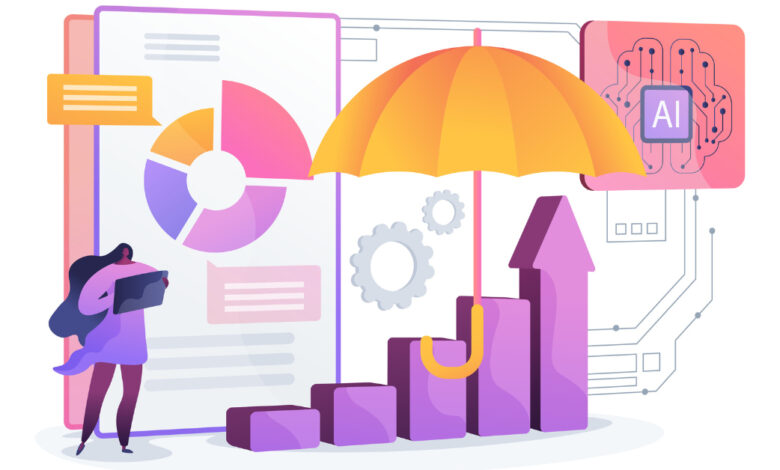
These days, there aren’t very many spaces left where AI isn’t dominating the conversation, including the insurance industry. Whether you think it’s a truly disruptive force or merely an overhyped trend, AI is everywhere. Many may fear AI has descended upon us to take our jobs, but in reality, AI is not supplanting insurance agents, it is actually poised to become one of their most valuable partners.
In this symbiotic relationship, AI will automate the more mundane or tedious tasks, freeing up insurance agents to focus on the uniquely human elements of their profession—building strong client relationships through trust, empathy, and personalized guidance. The real power of AI in insurance isn’t about creating autonomous systems that render human workers unnecessary, but in amplifying the agent’s ability to deliver exceptional, tailored service. This evolution requires a shift in perspective, moving away from viewing AI as a threat to embracing it as a strategic tool for growth, efficiency, and deeper client engagement.
The value of the human touch
Insurance is one of the oldest industries, and has always been seen as a “handshake” business, where human interaction is key to the value provided. Even in the face of rapidly advancing agentic AI models, it’s difficult to imagine a future where agents are replaced. Clients aren’t just looking for policies or coverage options, they’re looking for peace of mind.
Insurance agents are tasked with managing risk, dealing with uncertainty, and perhaps most importantly, securing the future well-being for their clients. The security and future success of their clients is in the hands of these human agents, and that requires trust, empathy, and human intuition—qualities that are beyond the reach of even the most advanced machines.
AI can do a lot, but there are some skills that are unique to an experienced insurance agent:
- The ability to empathize with their clients and provide tailored coverage recommendations based on a deep understanding of their client’s fears, aspirations, and unique life circumstances
- Trust and relationship building based on reliability, integrity, and genuine care and advocacy for their client’s well-being
- Strategic advice that goes beyond the transaction, and considers the client’s evolving needs over time
These elements form the foundation of the agent-client relationship. Until AI reaches full sentience, it’s not going to replace the human experience agents provide and clients desire. People will still want to talk to a human and have a human make the ultimate financial decisions.
Nobody can argue with efficiency
One of the most obvious benefits of AI is the time it saves in the back-end by streamlining operations and automating repetitive, time-consuming tasks that can clog up an agent’s to-do list. While the current CRM (customer relationship management) systems that are in place offer basic automation capabilities, AI is supercharging this.
AI-powered tools can digest large data sets, manage schedules, draft communications, and pre-fill forms with high accuracy. AI can deliver relevant information to the agent’s fingertips, when they need it, by quickly sorting through policy documents, historical data, and even market information. AI can augment an agent by catching mistakes or finding coverage gaps, in the same way that spellcheck is now ubiquitous in all written communications.
We’ve established the value AI brings to the table with automation, but the real showstopper is its ability to store a truly tremendous amount of knowledge in its “brain,” well beyond what’s possible for a human. This “AI brain” can serve as an extension of the agent’s, providing them with powerful insights, such as the ability to track evolving client needs over long periods. For example, AI could flag that a client’s child, mentioned in their file 16 years prior, is now of driving age, prompting the agent to proactively offer relevant insurance adjustments. This level of long-term memory and proactive insight strengthens the agent’s advisory role.
Every agent wishes for an executive assistant to help them manage the myriad of touchpoints with the customer throughout the quoting process and the multi-year life of a policy, but that’s just not realistic… until now. AI’s capacity for intelligent information management extends to streamlining more intricate agent workflows such as building a profile of the best times for a check-in or follow-up. AI can do this by taking into account a policyholder’s portfolio, an agent’s notes, even listening in on calls and reading emails. Now every agent can have an executive assistant.
Another area long over due for a little AI facelift is the legacy carrier systems. These outdated tech stacks are not only expensive to implement but also rigid and difficult to navigate. As the generation of agents who built and maintained these systems retires, it’s time for the next generation of agents to embrace AI. Legacy systems can feel clunky and difficult to navigate, but AI could act as a translator, bridging the gap between old infrastructure and modern workflows.
Waiting for a carrier to overhaul its old system is like waiting for rain in a drought, so why not take matters into your own hands with AI? Agents can leverage AI to generate quotes quickly and accurately, freeing them up to focus their energy on client relationships. AI is a massive equalizer in the sense that you don’t need tremendous technical skills to use it effectively. What may have seemed too intimidating (automation, data parsing, etc.) will become accessible for even the most technophobic agents.
AI is ushering in a new era where we’ll start to see agents more engaged with their communities, building a stronger understanding of macroeconomic and risk factors in their cities and townships. Agents will also be more available to provide their clients with support during those critical life-changing claims or after a catastrophe, offering that crucial human touch when it’s needed most. You’re also going to see agents expand their product offerings, perhaps adding lines like life insurance or pet insurance, because they have the bandwidth to do so.
What does the future hold?
While generalized AI models have been an absolute game-changer, especially when it comes to rote efficiency gains, the development of industry-specific insurance AI models is an incredibly exciting prospect. The insurance industry will likely leverage current technology to develop more insurance-specialized models that capture the knowledge a veteran claims adjuster or a seasoned insurance agent might possess. AI that truly understands the nuances of insurance is where the real transformative potential lies.
So, what skills become even more important for agents in this AI-powered future? The obvious answer is to rattle off a list of technical skills or platforms. While familiarity with these tools will certainly be valuable, the most important trait for agents in an AI-driven world is curiosity. This space is evolving quickly and will continue to do so for generations. Agents need to maintain an open mind and have some fun exploring these new technologies; it’s in that experimental headspace that you’ll have that eureka moment where you discover a new and impactful way for AI to make a significant difference to your agency.
A future fueled by AI isn’t about machines replacing people; it’s about skilled, empathetic agents leveraging intelligent tools to build stronger relationships and deliver unparalleled service in an increasingly computerized world. Embracing this collaborative future is the key to sustained success for agents, and most importantly, for the clients they serve.





